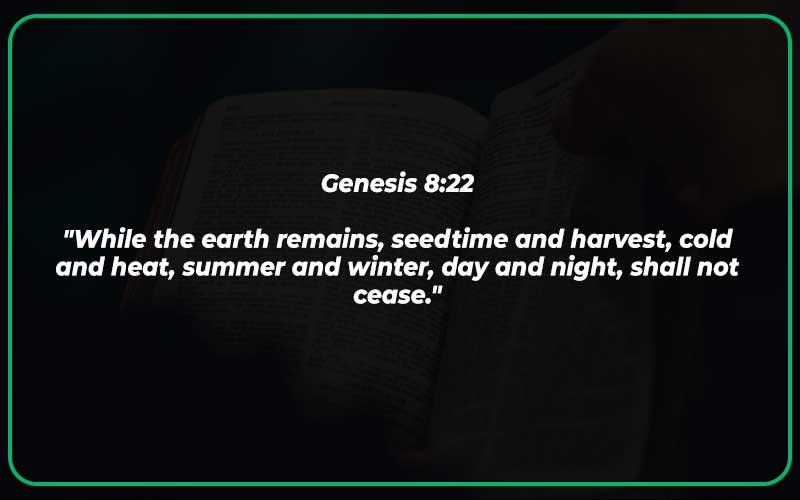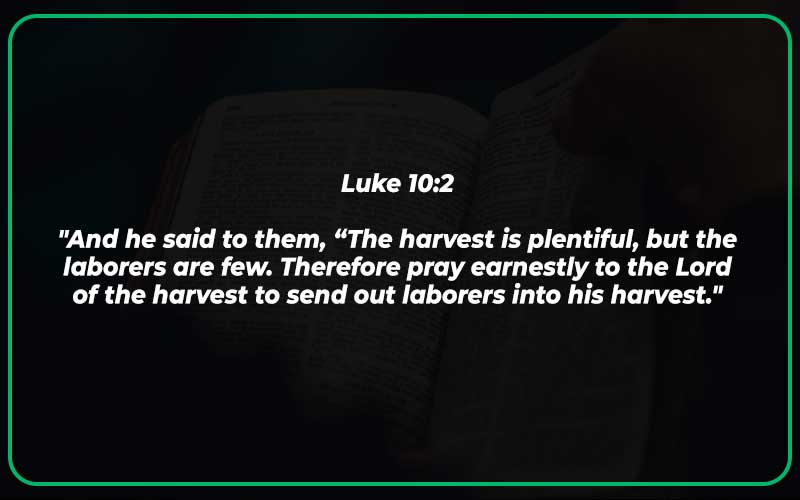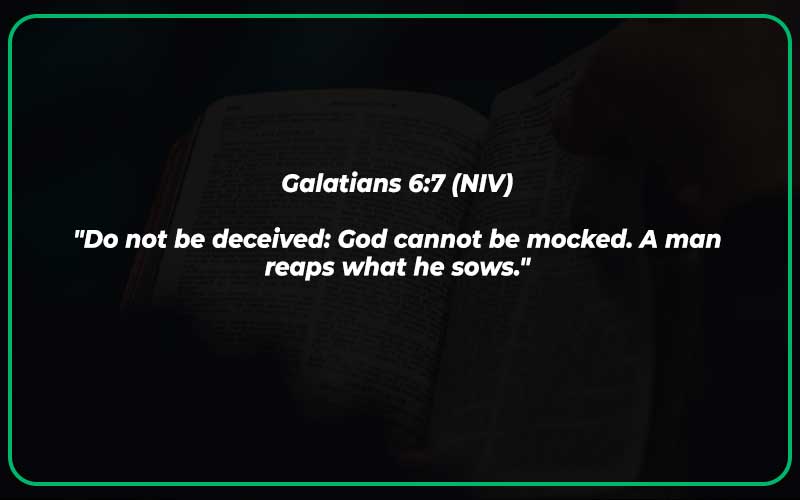The harvest season is a time of celebration and gratitude, representing the culmination of hard work and the abundance of blessings. In the Bible, the concept of harvest is not only associated with crops but also holds spiritual significance.
Join me on this blog post as we explore verses about the harvest, uncovering the profound truths and lessons hidden within this metaphorical framework.
Together, we’ll discover how these scriptures can inspire us to cultivate patience, gratitude, and a deeper understanding of God’s faithfulness in our lives. So grab your metaphorical sickle, and let’s embark on a journey through the biblical fields of wisdom.
Also Read: Bible Verses About Cancer
Bible Verses About The Harvest
Leviticus 23:10
“Speak to the people of Israel and say to them, When you come into the land that I give you and reap its harvest, you shall bring the sheaf of the firstfruits of your harvest to the priest.”
In this verse, God commands the Israelites to offer the firstfruits of their harvest to the priest as an offering of thanksgiving. It shows the importance of recognizing God’s provision in our lives and expressing gratitude to Him.
Proverbs 10:5
“He who gathers crops in summer is a prudent son, but he who sleeps during harvest is a disgraceful son.”
This verse advises against laziness during the harvest season, emphasizing the value of hard work and diligence in reaping the rewards of our labor. It encourages us to take advantage of the opportunities presented to us by the harvest season.
Matthew 9:37-38
“Then he said to his disciples, “The harvest is plentiful, but the laborers are few; therefore pray earnestly to the Lord of the harvest to send out laborers into his harvest.””
Jesus speaks about the plentiful harvests that are available and the need for workers to reap the fields. He calls on His disciples to pray that the Lord will raise up more laborers for His harvest, highlighting the importance of evangelism and sharing God’s Word.
Galatians 6:9
“And let us not grow weary of doing good, for in due season we will reap, if we do not give up.”
This verse encourages us to persevere in our efforts to serve and honor God, even when we face challenges and hardships. It reminds us that our labor will eventually bear fruit if we remain committed and faithful to God.
Revelation 14:15
“And another angel came out of the temple, calling with a loud voice to him who sat on the cloud, “Put in your sickle, and reap, for the hour to reap has come, for the harvest of the earth is fully ripe.””
This verse describes an image of the final harvest, where the Lord will gather the saved and unsaved alike. It serves as a reminder of God’s sovereignty and the ultimate importance of recognizing and responding to His call in our lives.
Genesis 8:22
“While the earth remains, seedtime and harvest, cold and heat, summer and winter, day and night, shall not cease.””
God promised Noah that as long as the earth remains, there will always be seedtime and harvest, indicating that the rhythm of sowing and reaping is an established pattern in nature. This verse highlights the consistency and reliability of God’s provision in our lives.

Ruth 2:2
“And Ruth the Moabite said to Naomi, “Let me go to the field and glean among the ears of grain after him in whose sight I shall find favor.” And she said to her, “Go, my daughter.””
Ruth goes to the fields to glean from the harvest, symbolizing the practice of gleaning in the Bible, where the poor and marginalized were allowed to gather leftover crops from the harvest fields. This verse highlights the importance of generosity and providing for those in need.
Isaiah 9:3
“You have multiplied the nation; you have increased its joy; they rejoice before you as with joy at the harvest, as they are glad when they divide the spoil.”
This verse describes the joy and celebration that comes with a bountiful harvest. It paints a picture of a grateful and satisfied people, expressing their happiness and gratitude to God for His provision.
Jeremiah 5:24
“They do not say in their hearts, ‘Let us fear the Lord our God, who gives the rain in its season, the autumn rain and the spring rain, and keeps for us the weeks appointed for the harvest.’”
This verse warns against forgetting the source of our harvest and provision, encouraging us to have a healthy reverence for God and acknowledging Him as the giver of all good things. It reminds us to keep our hearts focused on Him as the ultimate source of our blessings.
2 Corinthians 9:10
“He who supplies seed to the sower and bread for food will supply and multiply your seed for sowing and increase the harvest of your righteousness.”
Paul refers to God as the one who supplies both the seed for sowing and the bread for food. He encourages the Corinthians to be generous with their resources, promising that as they sow into the lives of others, God will increase their own harvests of righteousness.
Amos 9:13
““Behold, the days are coming,” declares the Lord, “when the plowman shall overtake the reaper and the treader of grapes him who sows the seed; the mountains shall drip sweet wine, and all the hills shall flow with it.”
This verse offers a prophetic declaration of abundant harvests in the days to come, emphasizing the overflowing and abundant nature of God’s provision. It encourages us to look forward to the blessings that God has in store for His people.
Deuteronomy 16:13-15
“You shall keep the Feast of Booths seven days, when you have gathered in the produce from your threshing floor and your winepress. You shall rejoice in your feast, you and your son and your daughter, your male servant and your female servant, the Levite, the sojourner, the fatherless, and the widow who are within your towns. For seven days you shall keep the feast to the Lord your God at the place that the Lord will choose, because the Lord your God will bless you in all your produce and in all the work of your hands, so that you will be altogether joyful.”
This passage commands Israel to celebrate the Feast of Booths, a time of rejoicing and thanksgiving for the harvest that God has provided. It highlights the joy and unity that comes with recognizing and celebrating God’s blessings together.
Hosea 10:12
“Sow for yourselves righteousness; reap steadfast love; break up your fallow ground, for it is the time to seek the Lord, that he may come and rain righteousness upon you.”
Hosea urges the people to sow righteousness and reap steadfast love, emphasizing the importance of cultivating a close relationship with God. He encourages us to seek the Lord during the harvest season, acknowledging that it is the perfect time to experience His abundant blessings.
Joel 3:13
“Put in the sickle, for the harvest is ripe. Go in, tread, for the winepress is full. The vats overflow, for their evil is great.”
This verse speaks of the coming harvest of judgment, warning of the consequences that will come for those who have turned away from God and embraced evil. It serves as a reminder to stay focused on righteousness and seek to glorify God in all that we do.
Luke 10:2
“And he said to them, “The harvest is plentiful, but the laborers are few. Therefore pray earnestly to the Lord of the harvest to send out laborers into his harvest.”
Jesus urges His disciples to pray for more workers to be sent out into the field, emphasizing the importance of evangelism and sharing God’s Word with those who are lost. This verse highlights the urgency of the harvest and the need for us to be actively engaged in furthering God’s kingdom.

Understanding the Spiritual Meaning of Harvest
Beyond the literal agricultural meaning, the Bible often uses harvest as a metaphor to convey spiritual truths. In the Old Testament, harvest frequently represented God’s provision and faithfulness to His people, Israel. For instance, in Leviticus 26:4 (NIV), God promises the Israelites:
“I will send you rain in its season, and the ground will yield its crops and the trees their fruit.”
This verse illustrates God’s faithfulness in providing for His people’s physical needs during harvest time, assuring them that obedience to His commandments would result in abundance and prosperity.
In the New Testament, the concept of harvest expands to include the spiritual harvest of souls. Luke 10:2 (NIV) conveys Jesus’ instructions to his disciples:
“He told them, ‘The harvest is plentiful, but the workers are few. Ask the Lord of the harvest, therefore, to send out workers into his harvest field.'”
Here, Jesus emphasizes the urgency of sharing the Gospel with those who are spiritually ripe, ready to accept and follow Him. The “harvest field” represents the world, and the “workers” are the disciples and believers who are called to spread the message of salvation.
Parables of the Harvest
To convey profound spiritual truths about the kingdom of God, Jesus often used parables related to agriculture and the harvest. Two significant parables are the Parable of the Sower and the Parable of the Wheat and the Tares.
1. The Parable of the Sower (Matthew 13:3-9, NIV)
“A farmer went out to sow his seed. As he was scattering the seed, some fell along the path, and the birds came and ate it up. Some fell on rocky places, where it did not have much soil. It sprang up quickly because the soil was shallow. But when the sun came up, the plants were scorched, and they withered because they had no root. Other seed fell among thorns, which grew up and choked the plants. Still, other seed fell on good soil, where it produced a crop—a hundred, sixty, or thirty times what was sown. Whoever has ears, let them hear.”
In this parable, Jesus explains that the seed represents the Word of God, and the different types of soil symbolize the various conditions of people’s hearts when they hear the message. The good soil represents those who hear the Word, understand it, and bear abundant fruit, while the other soils represent the challenges and obstacles that prevent people from receiving and accepting the Gospel.
2. The Parable of the Wheat and the Tares (Matthew 13:24-30, NIV)
“Jesus told them another parable: ‘The kingdom of heaven is like a man who sowed good seed in his field. But while everyone was sleeping, his enemy came and sowed weeds among the wheat and went away. When the wheat sprouted and formed heads, then the weeds also appeared. The owner’s servants came to him and said, ‘Sir, didn’t you sow good seed in your field? Where then did the weeds come from?’ ‘An enemy did this,’ he replied. The servants asked him, ‘Do you want us to go and pull them up?’ ‘No,’ he answered, ‘because while you are pulling the weeds, you may uproot the wheat with them. Let both grow together until the harvest. At that time, I will tell the harvesters: First, collect the weeds and tie them in bundles to be burned; then gather the wheat and bring it into my barn.'”
In this parable, Jesus illustrates that in the world, there will be both believers (wheat) and unbelievers (tares) growing together until the time of harvest, which signifies the final judgment. The parable highlights God’s patience and wisdom in allowing both to coexist temporarily, with the ultimate separation and reward awaiting during the final harvest.
Applying the Lessons of Harvest in Our Lives
The symbolism of harvest in the Bible holds numerous lessons that we can apply to our spiritual lives and daily walk with God.
1. Sowing and Reaping
Just as a farmer sows seeds and reaps a harvest, our actions and choices in life have consequences. Galatians 6:7 (NIV) states:
“Do not be deceived: God cannot be mocked. A man reaps what he sows.”
We are encouraged to sow righteousness, kindness, and love, for they will bear fruits of blessings and joy in due time.

2. Sharing the Gospel
Jesus reminds us in the verse from John 4:35 that the fields are ripe for harvest. There are people around us who are ready to receive the message of salvation and experience a transformation in their lives. As believers, we are called to share the Good News with others, being sensitive to the leading of the Holy Spirit.
3. Patience and Trust
The parable of the wheat and the tares teaches us to trust in God’s wisdom and timing. Sometimes, we may encounter challenges and difficult circumstances while living in a world with both believers and unbelievers. However, we must remain patient, trusting that God will ultimately bring about justice and reward in His perfect timing.
4. Gratitude for God’s Abundance
Psalm 65 beautifully expresses gratitude for God’s abundant blessings and provision. As we reflect on the physical harvest during harvest seasons, it is essential to remember the spiritual harvest of souls that God brings forth through the work of His people.
In conclusion, the Bible verses about harvest provide us with valuable insights into God’s faithfulness, His desire for the salvation of souls, and the principles of sowing and reaping.
The spiritual meaning of harvest teaches us to be diligent workers in God’s kingdom, sharing the Gospel with a sense of urgency, and trusting in God’s providence.
As we celebrate the harvest seasons in the natural world, let us also rejoice in the spiritual harvest, knowing that God’s abundant blessings are available for all who seek Him with open hearts. May we be inspired to live lives that bring glory to God and bear fruit that lasts for eternity.

